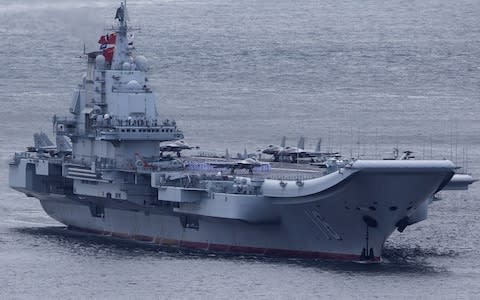China says conflict with Taiwan ‘more probable’ after US agrees to help Taipei build submarines

A conflict between China and Taiwan is becoming "more probable" after Donald Trump agreed to help Taipei build its own submarines, Chinese media said.
The US gave the go ahead for defence contractors to help Taiwan build an indigenous fleet after repeated appeals from Taiwan for help to bolster its defences against an increasingly assertive China.
The decision has prompted Chinese officials to warn the US against playing the 'Taiwan card' amid an escalating trade war between the two countries.
Taiwan first sought help from the US to build submarines in 1969, but Washington and European nations were reluctant to assist Taiwan in building a 12-boat fleet because of Chinese objections.
George W Bush's administration said it would help Taiwan acquire diesel electric submarines, but after little progress, Taipei launched a plan to manufacture its own submarines last year.
The office of Taiwan’s president Tsai Ing-wen thanked the US for its recent decision, while the defence ministry described the go ahead as a “breakthrough.”

However, media and officials in China - which considers Taiwan a renegade province which will be reunited with the mainland - expressed anger at US interference in Taiwan.
The nationalist Global Times newspaper said: "The mainland needs to continue to prepare for a possible military clash across the Straits.
"A military showdown with Taiwan is becoming more probable and may take place sooner rather than later."
Liu Jieyi, the director of China's Taiwan Affairs Office, said "some Americans indeed intend to play the Taiwan card".
"This will not only harm the entire Chinese people, but harm rights and interests of Taiwan compatriots," he said, according to Xiamen TV.
At a glance | The One China policy
Taiwan's former defence minister, Andrew Yang, told The Telegraph the ruling was “a very important first step” in a process that could take at least ten years.
He said there was little surprise in Taipei over China’s negative reaction. “Beijing is always protesting US support for Taiwan in terms of providing defensive articles, particularly with regards to submarines. Submarines are more sensitive,” he said.
Michael Tsai, another former defence minister, said: “China is expanding its very aggressive military activity around the Taiwan Strait and South China Sea.
"Taiwan needs to strengthen its self defence capability, including submarines, to deter China from taking further aggressive military action in this area."

However, the decision has not been universally welcomed in Taiwan, where there are concerns that it could provoke Beijing amid its worsening trade spat with the US.
“This is the right decision at the wrong time,” said Dr Ching Chang, a former naval officer and now a research fellow at the Society for Strategic Studies.
“Given the present awful situation in cross-Strait relation and US-Sino interactions regarding commercial disputes it is very hard for us to see it as a blessing and not a curse,” he said.
US-China Relations | What US presidents have said on Taiwan
Jason Hsu, a leading member of the Kuomintang opposition party said the decision was further sign of the US “flexing its muscles to China” amid growing tensions over trade.
“This is a double-edged sword," he said.
"We do need the technology. However, at this particular time I think it would be like swallowing an unknown medicine without knowing its consequences or side-effects."
Additional reporting by Christine Wei

